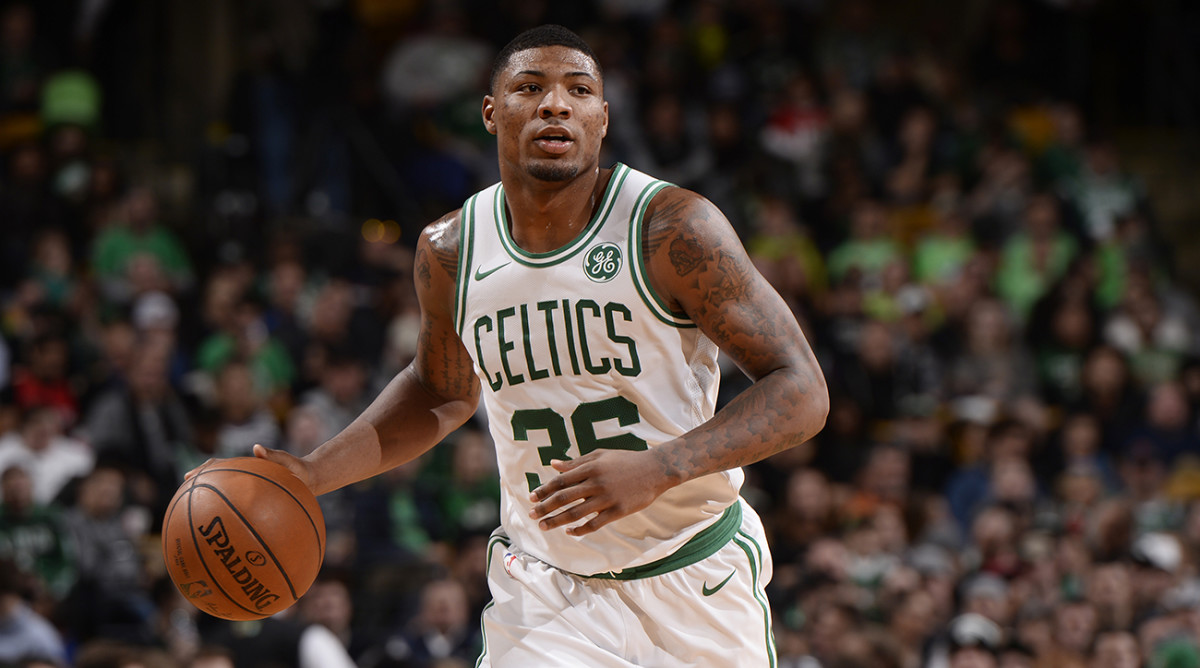Grades: Paying Marcus Smart Worth the Cost for the Celtics

One of the biggest remaining off-season pieces fell into place on Thursday, as restricted free agent guard Marcus Smart reportedly agreed to a four-year, $52 million contract to remain a member of the Boston Celtics. Let’s grade the move.
From Smart’s point of view, this is a coup of a contract in a market dry on teams with substantial cap space. Now, the Celtics are dipping into the luxury tax, at least for the time being, to foot the bill. At this point it’s fair to say that no serious suitors were ready to swoop, and Boston could have used that leverage and given Smart no choice but to sign his qualifying offer of $6.1 million and become an unrestricted free agent next season. That the two sides came to an agreement that offers him long-term financial security under those circumstances points to how the team values his contributions, and will earn the Celtics some brownie points from players and their agents.

A uniquely tough-minded player, the essence of Smart’s value outside of a box score can sometimes be hard to quantify. There’s no doubt his skills are most meaningful in Boston. With those things noted, it made some sense on both sides to push for a contract this season. There will be more cap space all around next season, but also a starrier free agent class, and Smart won’t have to risk hitting a potentially lukewarm market again. The nature of his game and the element of toughness and nonstop effort he provides is a key tone-setting element off the bench for the Celtics, even if they have to swallow his shaky, streaky shooting (Smart is a career 36% shooter, and an icky 29.3% from outside). He’s afraid of no moment or opponent, a quality that serves him well as a hard-nosed defender, but can get him into trouble when it comes to shot selection. Luckily, Boston as constituted isn’t asking him to do much scoring.
After all, the Celtics are going for it, and they need a full deck. They preferred keeping Smart engaged and taking contractual concerns off his plate to any alternative. With LeBron out West, Gordon Hayward and Kyrie Irving on the mend, and Jayson Tatum and Jaylen Brown two of the brighter young talents anywhere, Boston is positioned even better to make a run at the Eastern Conference this season. With that in mind, at some point, going into the tax to pay a player they like becomes worth it. Championship teams have to spend.
This season is the Celtics’ cleanest window to contend, noting that Al Horford and Irving both have player options next summer and that they’ll have to go through this process again with Terry Rozier, who will be a restricted free agent. The exact structure of the deal is yet to be seen, but Smart’s relatively reasonable salary can always be moved later if Boston chooses. Given he’s only 24, the money shouldn’t become an albatross, and working to get this deal out of the way now was sensible. If the young guys stay on track, maintaining their core is going to get a lot more expensive over the next few years.
Which East Teams Benefit Most from LeBron James Moving West?
Although Smart still has his frustrating, mercurial moments on the court, bottom line is that it’s still nice to see glue guys get rewarded in a league that tends to pay up for scorers and stat-stuffers. It will be exciting to watch the Celtics run it back with a full team. While re-establishing roles and minutes will pose new challenges for Brad Stevens after Boston’s shorthanded but highly impressive playoff run, they can at least bet on continuity and opportunity to help work things out. For this season, paying to keep Smart should be worth the cost, and in the end, that’s where the Celtics’ focus should be. It’s a relatively high sum for him that could limit their flexibility down the line, but that’s the price of contention. If Boston wiggles its way into a Finals berth or two, the money will be hard to yell about.
